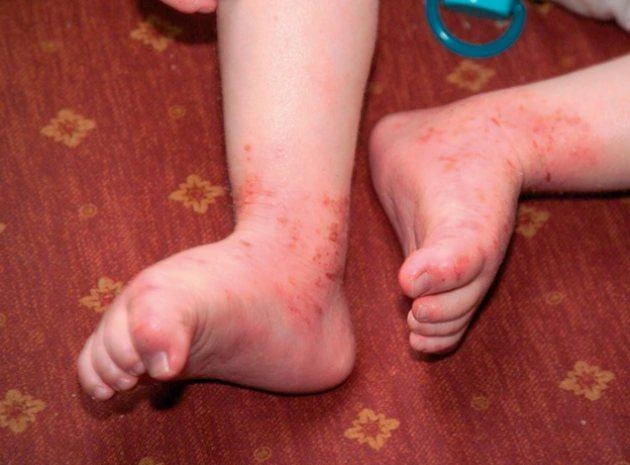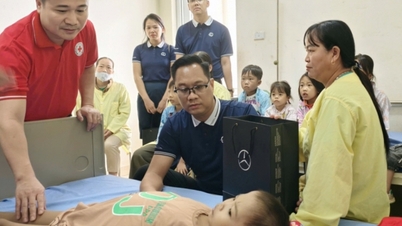
Reader Ngoc Dung, 40 years old, Tan Phu, HCMC: Doctor, please advise. My child has atopic dermatitis, sometimes diagnosed with eczema. Every time the weather changes, her skin peels, cracks, even her fingers and toes become ulcerated and ooze. Her physical education scores at school are always low due to the effects of the disease. My daughter is 11 years old this year, has had this disease since she was little. She feels very self-conscious and withdrawn. Her family also took her to get treatment, but the disease only goes away at that time, then it comes back. I hope the doctor will have mercy on her and advise her on a way to completely cure her.
BS-CKI Nguyen Minh Phong, Dermatologist - Nam Saigon International General Hospital:
Hello Ms. Ngoc Dung,
Atopic dermatitis (also known as atopic eczema) is a common chronic skin inflammation, most easily recognized by red patches of skin, which may be accompanied by blisters, dry skin, flaking and itching. Depending on the sensitivity of the body, atopic dermatitis can cause varying degrees of severity and is a chronic disease that tends to recur in episodes. The disease is common in people with a family history of asthma, allergic rhinitis, and dermatitis. The disease often appears in children and can last a lifetime.
Atopic dermatitis can be divided into 3 stages:
Acute phase: the skin may have red patches, possibly with blisters, and severe itching. The wound is wet, oozing yellow fluid, and is swollen. Easily infected with bacteria from the external environment.
Subacute stage: skin redness and secretions decrease, yellow crusts form and new skin forms, skin conditions have milder symptoms than in the acute stage.
Chronic stage: thick skin patches, lichenification, cracks, frequent and persistent itching appear.

Atopic dermatitis can come from a number of causes:
- Genetics : If both parents have the disease, the child has an 80% chance of having the disease (some genes related to atopic dermatitis have been identified).
- Environmental factors play a role in triggering: Allergens found in house dust, animal hair, clothing, household items, etc.; bacterial infections, especially staphylococcus aureus.
- Immune response imbalance.
I sympathize with the case of Ms. Dung's daughter, who is now 11 years old. She was diagnosed with atopic dermatitis since childhood and often feels self-conscious due to the difficulties caused by acute dermatitis attacks, affecting her daily activities and psychology.
The doctor would like to inform you that: Atopic dermatitis is a chronic or recurring disease. However, about 70% of children with atopic dermatitis will recover in adulthood. The remaining 30% will have persistent symptoms. And this is not a dangerous disease, if treated properly, the disease can be controlled, maintaining the skin in a normal state for a long time, limiting the frequency of occurrence and the impact of disease outbreaks.
You should take your child to clinics, medical facilities, and hospitals with reputable dermatology departments to conduct tests and accurately diagnose the stage of your child's illness. From there, specialists will provide appropriate treatment methods to improve the skin condition, helping your child overcome self-consciousness and return to normal activities. Note, absolutely do not self-medicate your child to avoid causing unwanted complications. Please inform me.
HELLO DOCTOR
Source: https://www.sggp.org.vn/viem-da-co-dia-co-the-duoc-kiem-soat-neu-dieu-tri-dung-cach-post760820.html
















































































































Comment (0)